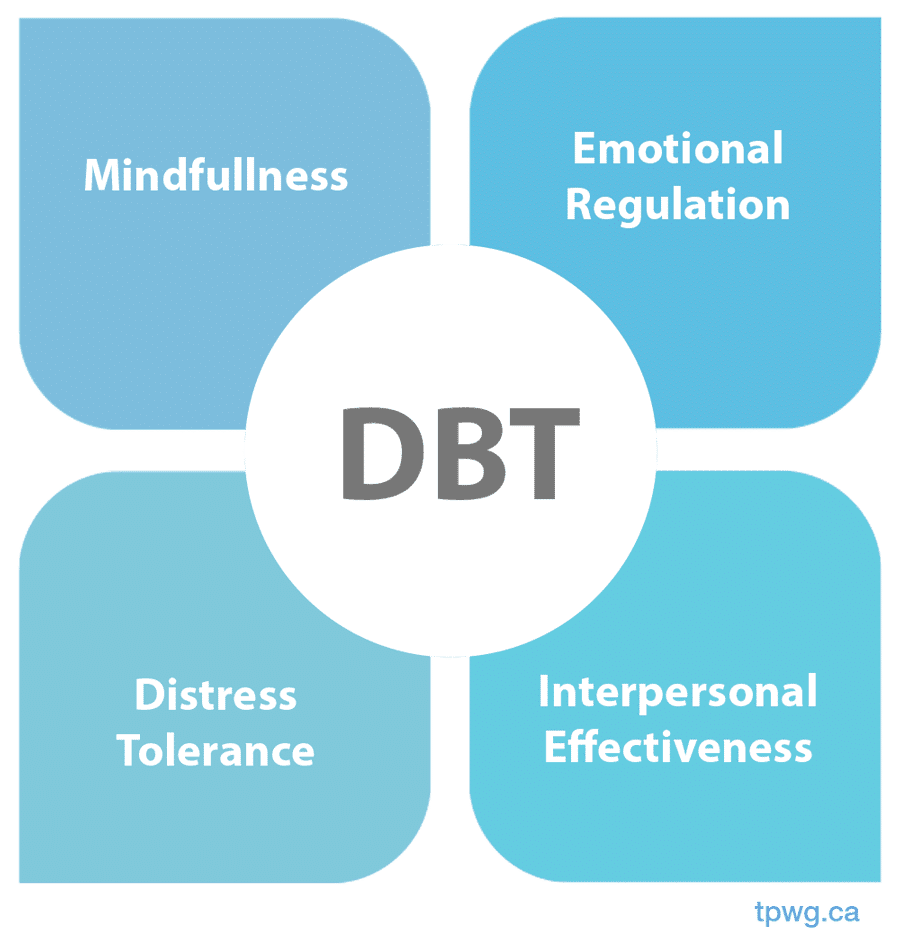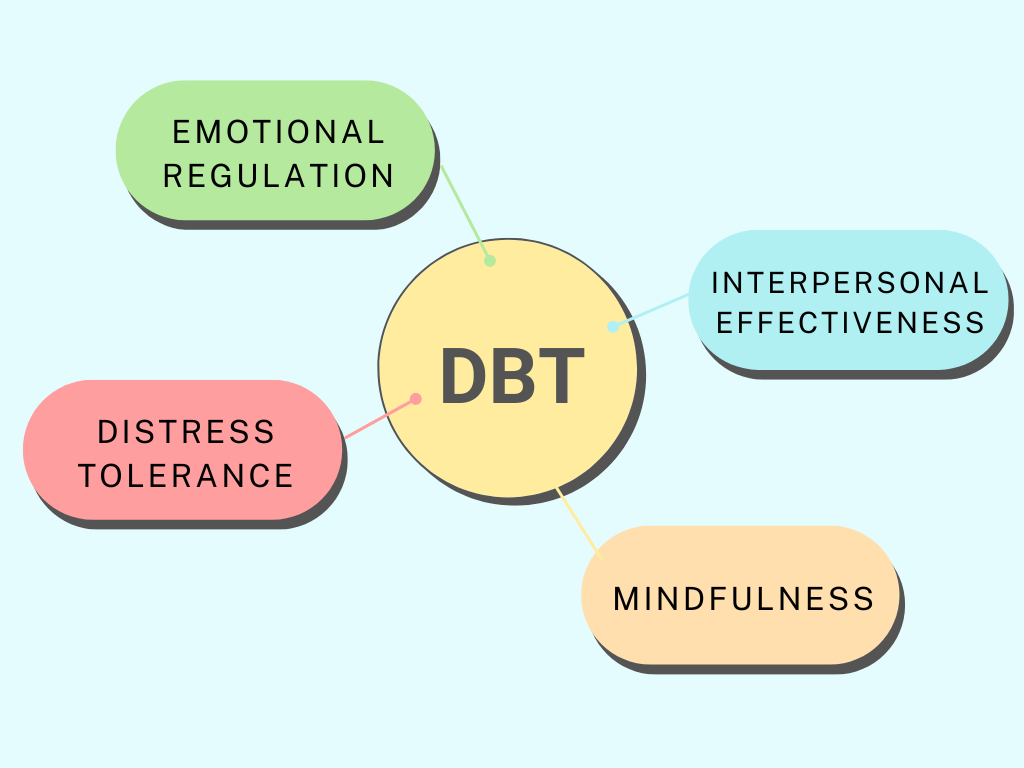Experience Growth and Revival with DBT London's Expertise
Experience Growth and Revival with DBT London's Expertise
Blog Article
Encouraging People With Effective Dialectical Behavior Therapy (DBT) Providers: Structure Stronger Mental Health Foundations
In the realm of psychological wellness and wellness, the importance of encouraging people with effective Dialectical Behavior Therapy (DBT) services can not be overstated. By focusing on the core principles of DBT, such as improving psychological law skills, improving social performance, constructing distress tolerance methods, and cultivating mindfulness practices, people can start a journey in the direction of structure stronger mental health and wellness structures. The impact of DBT surpasses simple symptom management; it provides an all natural method that equips individuals with the tools required to browse life's challenges with resilience and self-awareness. As we explore the transformative potential of DBT in equipping individuals to lead even more fulfilling lives, the path to boosted mental health and wellness and health becomes an engaging story that beckons exploration.
Comprehending the Core Principles of DBT


One core principle of DBT is validation. Another basic aspect is dialectics, which instructs people to watch situations from multiple point of views and find the synthesis in between conflicting thoughts or emotions.
Furthermore, the concept of dialectical abstinence is main to DBT. This concept encourages people to avoid suicidal habits while also accepting themselves. By recognizing and integrating these core concepts, therapists can effectively implement DBT techniques and support people in their trip in the direction of psychological guideline and mental wellness.
Enhancing Emotional Guideline Abilities
Creating effectiveness in managing emotions is a fundamental facet of fostering mental wellness and social efficiency - DBT London. Enhancing emotional policy abilities is a core part of Dialectical Practices Therapy (DBT) that gears up people with the devices to browse extreme emotions in a healthy and balanced and constructive manner. Via DBT, individuals learn to recognize, understand, and control their feelings, causing enhanced psychological health outcomes
DBT emphasizes the value of mindfulness, which involves existing in the minute without judgment. This technique allows people to observe their emotions without ending up being bewildered by them, boosting their capability to react successfully instead of react impulsively. By growing mindfulness, individuals can develop a higher sense of self-awareness and emotional control.
Furthermore, DBT teaches sensible skills such as distress tolerance and feeling law strategies to aid people handle difficult emotions. By learning these abilities, people can minimize spontaneous actions, enhance decision-making, and strengthen their connections with others. Eventually, boosting emotional regulation abilities through DBT equips people to lead more satisfying and well balanced lives.

Improving Interpersonal Efficiency
Having actually established a strong foundation in emotional guideline abilities within the framework of Dialectical Behaviour Treatment (DBT), the emphasis currently changes in the direction of enhancing interpersonal performance. Improving social performance is a crucial component of DBT as it equips individuals with the required skills to browse social communications, interact successfully, set limits, and develop healthier partnerships.
In DBT, social performance skills Web Site are educated through modules that concentrate on areas such as assertiveness, reliable communication, and interpersonal problem-solving. By discovering these skills, individuals can improve their capability to express their desires and demands, preserve self-esteem, and develop more powerful links with others.
Practicing mindfulness is an essential part of enhancing social efficiency within the DBT structure. Mindfulness permits people to be existing in their communications, pay attention proactively, and respond thoughtfully instead than react impulsively. By including mindfulness into their every day lives, individuals can cultivate greater self-awareness and psychological law, which are vital for effective social interactions.
Building Distress Tolerance Strategies
Checking out effective methods for handling psychological distress is important for people looking for to enhance their coping skills and resilience. Structure distress resistance strategies is an important aspect of Dialectical Practices Therapy (DBT) that equips individuals to navigate tough feelings without becoming overloaded - DBT London. One essential method in DBT for distress resistance is the acronym "APPROVES," which means Tasks, Adding, Comparisons, Feelings, Pressing away, Thoughts, and Sensations. By using these methods, individuals can successfully deal with distressing scenarios and regulate their emotional feedbacks.
Additionally, mindfulness practices play a significant duty in building distress tolerance. Mindfulness urges people to stay present in the moment without judgment, anchor enabling them to observe their ideas and emotions without reacting impulsively. This understanding makes it possible for people to tolerate distress extra properly and establish a higher sense of control over their feedbacks.
In addition to these methods, developing a customized distress resistance strategy with the guidance of a trained specialist can supply people with a tailored method to handling emotional distress - DBT London. By including these techniques right into day-to-day live, individuals can reinforce their mental health and wellness foundations and enhance their general well-being

Cultivating Mindfulness Practices
To grow their distress tolerance techniques better, individuals can focus on growing mindfulness methods as a complementary strategy within the structure of Dialectical Practices Treatment (DBT) Mindfulness, a key part of DBT, includes focusing on today moment without judgment. By fostering mindfulness, people can enhance their understanding of thoughts, emotions, and bodily sensations, promoting a deeper understanding of themselves and their experiences.
Mindfulness techniques in DBT consist of methods such as mindful breathing, body scans, and observing thoughts without add-on. These methods motivate individuals to create a non-reactive stance towards their internal experiences, allowing them to reply to tough scenarios with greater quality and composure. By integrating mindfulness into daily routines, individuals can discover to control their feelings better, reduce spontaneous behaviors, and cultivate a feeling of inner peace.
Through cultivating mindfulness practices, individuals undergoing DBT can develop a solid structure for taking care of tension, boosting connections, and enhancing total health. By integrating mindfulness right into their therapeutic trip, people can create useful skills that equip them to navigate life's obstacles with strength and self-awareness.
Final Thought
Finally, effective Dialectical Behavior Therapy (DBT) services play a critical duty in empowering people to develop more powerful psychological health and wellness structures. By comprehending the core concepts of DBT, improving psychological regulation abilities, improving social efficiency, developing distress tolerance strategies, and growing mindfulness techniques, individuals are geared up with the essential tools index to browse their feelings, connections, and difficulties in an extra resilient and adaptive way. DBT services provide a detailed approach to advertising psychological well-being and empowering people to lead satisfying lives.
By concentrating on the core principles of DBT, such as enhancing psychological regulation skills, improving social efficiency, constructing distress resistance methods, and cultivating mindfulness practices, individuals can get started on a journey in the direction of building stronger mental health and wellness foundations. Enhancing emotional guideline abilities is a core part of Dialectical Practices Therapy (DBT) that gears up people with the devices to browse extreme emotions in a healthy and balanced and useful fashion.Moreover, DBT shows sensible abilities such as distress resistance and emotion regulation techniques to help individuals manage tough feelings.To strengthen their distress resistance methods further, individuals can concentrate on growing mindfulness methods as a complementary strategy within the structure of Dialectical Practices Therapy (DBT) By recognizing the core principles of DBT, boosting psychological regulation skills, improving interpersonal effectiveness, building distress tolerance techniques, and growing mindfulness practices, people are geared up with the required devices to navigate their emotions, connections, and challenges in an extra durable and adaptive manner.
Report this page